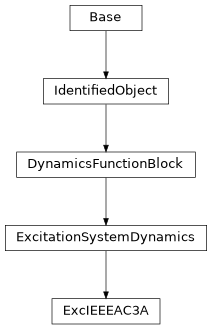cimpy.cgmes_v2_4_15.ExcIEEEAC3A module
- class cimpy.cgmes_v2_4_15.ExcIEEEAC3A.ExcIEEEAC3A(efdn=0.0, ka=0.0, kc=0.0, kd=0.0, ke=0.0, kf=0.0, kn=0.0, kr=0.0, seve1=0.0, seve2=0.0, ta=0.0, tb=0.0, tc=0.0, te=0.0, tf=0.0, vamax=0.0, vamin=0.0, ve1=0.0, ve2=0.0, vemin=0.0, vfemax=0.0, *args, **kw_args)[source]
The class represents IEEE Std 421.5-2005 type AC3A model. The model represents the field-controlled alternator-rectifier excitation systems designated Type AC3A. These excitation systems include an alternator main exciter with non-controlled rectifiers. The exciter employs self-excitation, and the voltage regulator power is derived from the exciter output voltage. Therefore, this system has an additional nonlinearity, simulated by the use of a multiplier whose inputs are the voltage regulator command signal, , and the exciter output voltage, , times . This model is applicable to excitation systems employing static voltage regulators. Reference: IEEE Standard 421.5-2005 Section 6.3.
- efdn:
Value of at which feedback gain changes (E). Typical Value = 2.36. Default: 0.0
- ka:
Voltage regulator gain (K). Typical Value = 45.62. Default: 0.0
- kc:
Rectifier loading factor proportional to commutating reactance (K). Typical Value = 0.104. Default: 0.0
- kd:
Demagnetizing factor, a function of exciter alternator reactances (K). Typical Value = 0.499. Default: 0.0
- ke:
Exciter constant related to self-excited field (K). Typical Value = 1. Default: 0.0
- kf:
Excitation control system stabilizer gains (K). Typical Value = 0.143. Default: 0.0
- kn:
Excitation control system stabilizer gain (K). Typical Value = 0.05. Default: 0.0
- kr:
Constant associated with regulator and alternator field power supply (K). Typical Value = 3.77. Default: 0.0
- seve1:
Exciter saturation function value at the corresponding exciter voltage, V, back of commutating reactance (S[V]). Typical Value = 1.143. Default: 0.0
- seve2:
Exciter saturation function value at the corresponding exciter voltage, V, back of commutating reactance (S[V]). Typical Value = 0.1. Default: 0.0
- ta:
Voltage regulator time constant (T). Typical Value = 0.013. Default: 0.0
- tb:
Voltage regulator time constant (T). Typical Value = 0. Default: 0.0
- tc:
Voltage regulator time constant (T). Typical Value = 0. Default: 0.0
- te:
Exciter time constant, integration rate associated with exciter control (T). Typical Value = 1.17. Default: 0.0
- tf:
Excitation control system stabilizer time constant (T). Typical Value = 1. Default: 0.0
- vamax:
Maximum voltage regulator output (V). Typical Value = 1. Default: 0.0
- vamin:
Minimum voltage regulator output (V). Typical Value = -0.95. Default: 0.0
- ve1:
Exciter alternator output voltages back of commutating reactance at which saturation is defined (V) equals V(V). Typical Value = 6.24. Default: 0.0
- ve2:
Exciter alternator output voltages back of commutating reactance at which saturation is defined (V). Typical Value = 4.68. Default: 0.0
- vemin:
Minimum exciter voltage output (V). Typical Value = 0.1. Default: 0.0
- vfemax:
Exciter field current limit reference (V). Typical Value = 16. Default: 0.0
Documentation of parent class ExcitationSystemDynamics:
Excitation system function block whose behavior is described by reference to a standard model
- DiscontinuousExcitationControlDynamics:
Discontinuous excitation control model associated with this excitation system model. Default: None
- OverexcitationLimiterDynamics:
Overexcitation limiter model associated with this excitation system model. Default: None
- PFVArControllerType1Dynamics:
Power Factor or VAr controller Type I model associated with this excitation system model. Default: None
- PFVArControllerType2Dynamics:
Power Factor or VAr controller Type II model associated with this excitation system model. Default: None
- PowerSystemStabilizerDynamics:
Power system stabilizer model associated with this excitation system model. Default: None
- SynchronousMachineDynamics:
Synchronous machine model with which this excitation system model is associated. Default: None
- UnderexcitationLimiterDynamics:
Undrexcitation limiter model associated with this excitation system model. Default: None
- VoltageCompensatorDynamics:
Voltage compensator model associated with this excitation system model. Default: None
Documentation of parent class DynamicsFunctionBlock:
Abstract parent class for all Dynamics function blocks.
- enabled:
Function block used indicator. true = use of function block is enabled false = use of function block is disabled. Default: False
Documentation of parent class IdentifiedObject:
This is a root class to provide common identification for all classes needing identification and naming attributes.
- DiagramObjects:
The domain object to which this diagram object is associated. Default: “list”
- description:
The description is a free human readable text describing or naming the object. It may be non unique and may not correlate to a naming hierarchy. Default: ‘’
- energyIdentCodeEic:
The attribute is used for an exchange of the EIC code (Energy identification Code). The length of the string is 16 characters as defined by the EIC code. References: Default: ‘’
- mRID:
Master resource identifier issued by a model authority. The mRID is globally unique within an exchange context. Global uniqueness is easily achieved by using a UUID, as specified in RFC 4122, for the mRID. The use of UUID is strongly recommended. For CIMXML data files in RDF syntax conforming to IEC 61970-552 Edition 1, the mRID is mapped to rdf:ID or rdf:about attributes that identify CIM object elements. Default: ‘’
- name:
The name is any free human readable and possibly non unique text naming the object. Default: ‘’
- shortName:
The attribute is used for an exchange of a human readable short name with length of the string 12 characters maximum. Default: ‘’
Inheritance Diagram:
